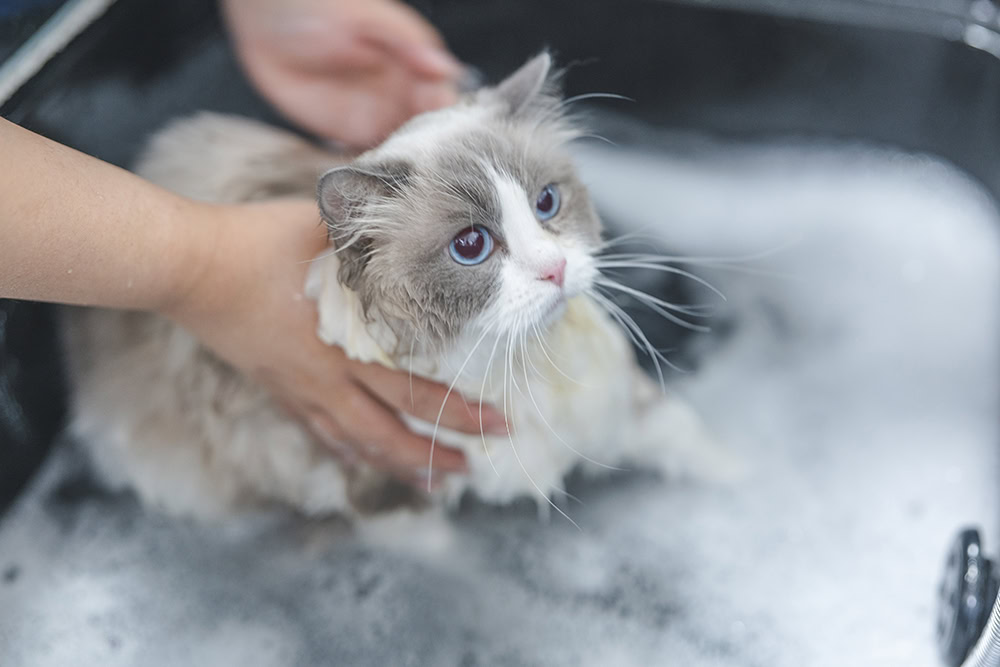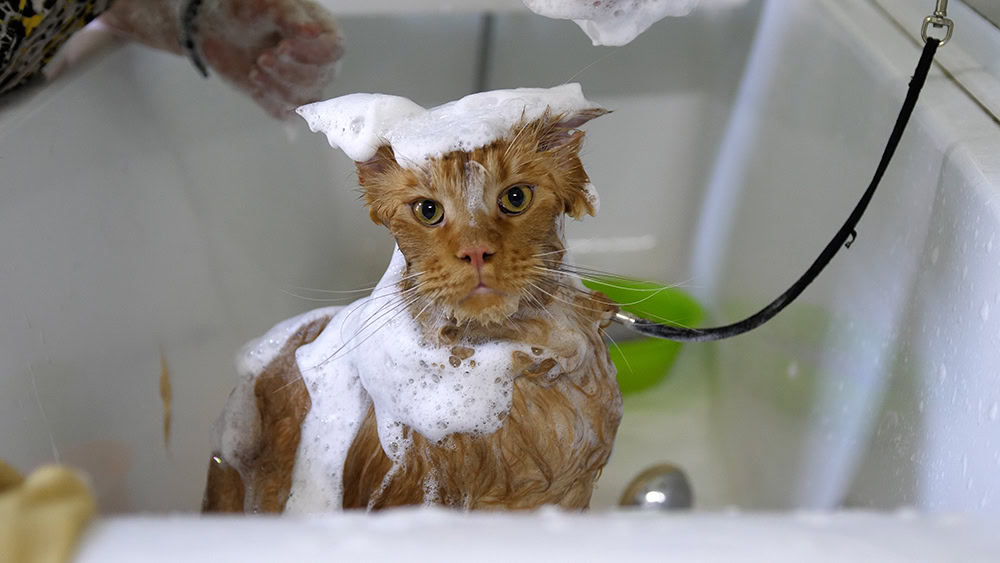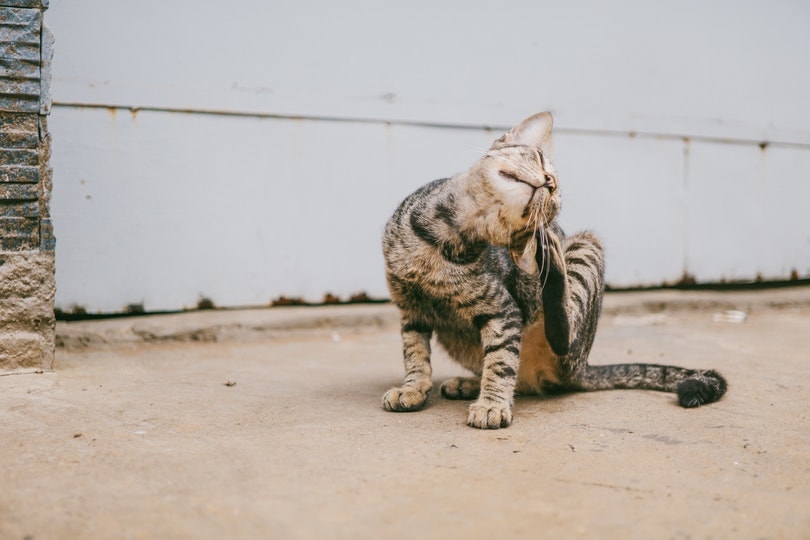VET APPROVED

The information is current and up-to-date in accordance with the latest veterinarian research.
Learn more »Ringworm—the name sends a shudder down the spines of animal shelter workers and veterinarians alike. This disease is contagious between cats, dogs, horses, and people. Getting rid of ringworm can be pesky, especially if you have a lot of pets.
Fortunately, there are two home remedies that can help slow and even stop the spread of ringworm before it takes hold.
Note: Home remedies are not an alternative to professional medical advice. If your pet has a serious issue, please consult your vet immediately.
Ringworm in Cats
If you’ve owned cats for any extended period of time, you’ve likely come across circular bald spots on your cat’s skin at some point. This can be ringworm, but despite the somewhat misleading name, ringworm is not actually a worm, but rather a fungal infection. The disease is fairly common in cats and 98% of cases are caused by Microsporum canis.
Cats most commonly get ringworm on their face, ears, paws, and tail, and although the disease is most common in young cats, older cats can be susceptible too, especially if they have a weak immune system by being infected with Feline Immunodeficiency Virus (FIV) for example.
This fungal disease is highly infectious and is spread through the spores via direct contact with an infected cat or contaminated object. Ringworm is a zoonotic disease meaning humans can be infected too. Cats with longer hair may have a harder time getting rid of a ringworm infection and it can range from a small patch to an infection all over the cat’s body.
If you have questions, we recommend speaking to a veterinarian for personalized assistance and advice.
The 2 Home Remedies for Treating Ringworm in Cats
1. Medicated Shampoo

Fortunately, there is an effective remedy that can be purchased over the counter. This is the best possible treatment for ringworm infection without consulting with a vet. Purchasing a shampoo medicated with antifungal ingredients such as miconazole and using it correctly will inhibit ringworm growth.
Even better, there are products specifically designed for cats and dogs so their skin doesn’t need to be irritated by human shampoo.
Some great options to look at include Malaseb Shampoo, Davis Miconazole Dog and Cat Shampoo, Vetoquinol Sebozole Shampoo for Dogs & Cats, and MiconaHex+Triz Shampoo for Dogs & Cats. Some of these shampoos have additional ingredients like antibacterial agents or colloidal oatmeal to help your cat. Use them as directed on the ingredients label but generally, you want to let the shampoo sit for 10 minutes before rinsing off.
- Antifungal properties
- Designed for cats
- May have additional ingredients to benefit your cat
- Time consuming
2. Lime Sulfur Dip

Another effective remedy used in animal shelters is a sulfurated lime solution. Vet Basics Lime Sulfur Dip Antimicrobial for Dogs, Cats & Horses is a liquid that can be diluted to make up a dip that helps to sterilize the coat and prevent ringworm spreading. It also reduces the amount of environmental contamination with ringworm.
Once you have doused your cat as directed in the dip, you can towel dry your cat. Treat them twice a week until they have recovered.
- Antifungal properties
- Designed for cats
- Best way to reduce environmental contamination and spread
- Time consuming

What Else Should I Do When My Cat Has Ringworm?
Aside from the shampooing you should take steps to help your cat recover and prevent any other pets or people getting ringworm. Consider:
- If you have done this before, clipping long-haired cats can help control the spread and clear ringworm faster.
- Remove your cat’s hair from the carpet, bedding, furniture etc.
- Disinfect areas where your cat has been with a diluted bleach solution.
- Wear gloves when handling your cat.
- Remove ringworm from fabrics, including clothes with two washes on the hottest cycle.
- Quarantine your cat for 3–6 weeks while they recover in a comfortable, easily disinfected area.
What About Natural Home Remedies?
Be wary of natural home remedies published online. Essential oils are toxic to cats so should not be used on their skin. Other remedies like apple cider vinegar or turmeric may appear harmless, but your cat is likely to lick them off their coat. Too much of either of these substances could lead to an upset stomach or other illness.
Aside from being harmful to cats, there is no good evidence they work specifically on ringworm in cats. Therefore, we have decided not to include any other remedies in this article.


Conclusion
A medicated shampoo containing antifungal ingredients is the best home remedy for your cat with ringworm. If your cat has a weak immune system or a severe ringworm infection they may need oral medication from the veterinarian, so don’t delay getting them help.
Remember ringworm is a zoonotic disease so please take steps to prevent this from spreading to you. If you have any health concerns contact your doctor.
- https://www.msdvetmanual.com/cat-owners/skin-disorders-of-cats/ringworm-dermatophytosis-in-cats
- https://www.healthline.com/health/home-remedies-for-ringworm
- https://sheltermedicine.wisc.edu/library/guidebooks/ringworm/treating-ringworm
- https://www.catster.com/cat-health-care/how-long-to-quarantine-a-cat-with-ringworm/
Related Read:
- How to Get Sap Out of Dog Hair: 6 Vet-Approved Steps
- How Long Should You Quarantine A Cat With Ringworm? (Vet Answer)
Featured Image Credit: FOX, Pexels












